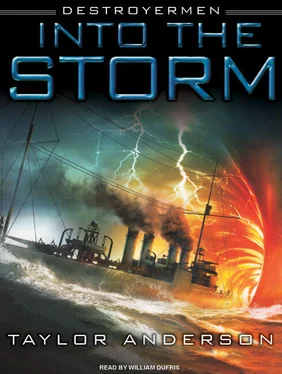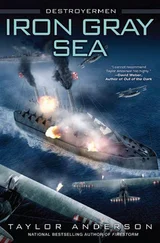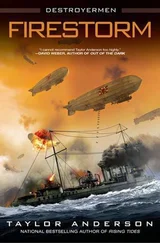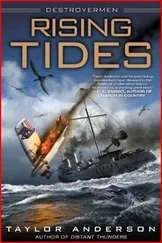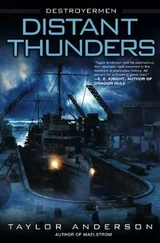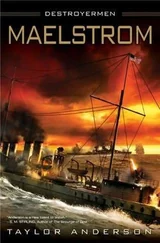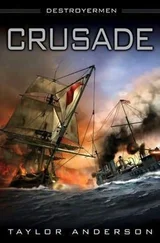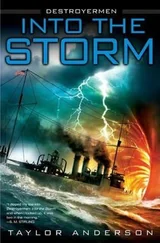Taylor Anderson - Into the Storm
Здесь есть возможность читать онлайн «Taylor Anderson - Into the Storm» весь текст электронной книги совершенно бесплатно (целиком полную версию без сокращений). В некоторых случаях можно слушать аудио, скачать через торрент в формате fb2 и присутствует краткое содержание. Жанр: Альтернативная история, на английском языке. Описание произведения, (предисловие) а так же отзывы посетителей доступны на портале библиотеки ЛибКат.
- Название:Into the Storm
- Автор:
- Жанр:
- Год:неизвестен
- ISBN:нет данных
- Рейтинг книги:3 / 5. Голосов: 1
-
Избранное:Добавить в избранное
- Отзывы:
-
Ваша оценка:
- 60
- 1
- 2
- 3
- 4
- 5
Into the Storm: краткое содержание, описание и аннотация
Предлагаем к чтению аннотацию, описание, краткое содержание или предисловие (зависит от того, что написал сам автор книги «Into the Storm»). Если вы не нашли необходимую информацию о книге — напишите в комментариях, мы постараемся отыскать её.
Into the Storm — читать онлайн бесплатно полную книгу (весь текст) целиком
Ниже представлен текст книги, разбитый по страницам. Система сохранения места последней прочитанной страницы, позволяет с удобством читать онлайн бесплатно книгу «Into the Storm», без необходимости каждый раз заново искать на чём Вы остановились. Поставьте закладку, и сможете в любой момент перейти на страницу, на которой закончили чтение.
Интервал:
Закладка:
Into the Storm
Taylor Anderson
CHAPTER 1
They were running. There was no other word for it, no comforting euphemism to make the sting less sharp. In fact, it seemed impossible to wring the slightest sense of purpose from the confusion, privation, terror, and bone-numbing weariness they’d endured since the very day the war began on December 7. Now, three months later, they were running away (“limping” might be the better term) and they hadn’t even had a chance to lick their wounds. The tired men and elderly ships of Destroyer Squadron (Des Ron) 29 had hurled themselves repeatedly at the implacable juggernaut that was the Japanese Imperial Navy while their numbers were ruthlessly slashed by disaster and disrepair. It was a tragically lopsided contest, a feeble gesture of defiance against overwhelming odds. In the end, a gesture was all it had been. Now all that remained was to flee-and it was probably too late.
Lieutenant Commander Matthew Patrick Reddy, USNR, the captain of USS Walker, stood on the starboard bridgewing and tried to maintain at least a semblance of dignity in his rumpled and sweat-stained shirt. His left hand clutched his hat to his head against the thirty-knot breeze while his right tried to keep the half-filled mug of lukewarm coffee from slopping onto his uniform.
Red-rimmed eyes squinted from what was normally an almost embarrassingly boyish face, but at the moment a general covering of brown stubble and a fatigue-slacked expression made him look older than his thirty-two years. Not quite thirty-six hours earlier, he and his exhausted crew had participated in the largest surface action of the war to date: the Battle of the Java Sea. For once, the forces were evenly matched-in numbers, if not quality-and they thought they’d had a chance. But from the beginning, nothing went right. The battle finally ended sometime in the night with the ruthless slaughter of virtually the entire force under Admiral Doorman’s command. While the enemy grew ever stronger, the scattered Allies were picked off in ones and twos.
Walker wasn’t there when the poor old Houston and the staunch Perth were surrounded and hammered to the bottom. All the destroyers had been ordered to Surabaya to refuel and had thus been granted a short reprieve. Edwards, Alden, Ford, and Paul Jones departed for Australia as soon as their bunkers were full, and nobody knew if they’d made it through the gauntlet or not. The remaining destroyers were ordered to wait for the British cruiser Exeter, the only capital ship to survive the battle, and escort her to Ceylon after she completed temporary repairs. Matt spent that day of short intermission sending out parties to scrounge anything they might use, but little turned up in the bombed-out remains of the Dutch naval yard. The searchers discovered some belted. 30 cal, eighty rounds of four-inch-fifty for the main guns, two condemned torpedoes, a little food. It wasn’t much. All the while, emergency repairs to Walker were under way. Even if Matt had found the time, he couldn’t have slept through the racket.
Now, standing on the bridgewing, he allowed a huge yawn to escape and hoped it made him look calm instead of just worn-out. The morning sun was bright, and the beauty of the vast, calm, almost violet sea was marred only by the distant hump of Bawean Island and the tiny cluster of American and British destroyers guarding Exeter’s wounded flanks like battle-weary army ants escorting their injured queen to a new home. As far as Matt knew, he was looking at all that remained of the Allied Forces in the American, British, Dutch, Australian-or ABDA-defensive area. He knew they’d been the last ones out of the tangled mass of wreckage and half-sunken hulks that Surabaya, Java, had become. ABDAFLOAT’s initial force was composed of two heavy cruisers, seven light cruisers, twenty-three destroyers, and about thirty submarines and assorted support vessels. Now all that was left were three battered, Great War-vintage U.S. “four-stacker” destroyers, one British destroyer, Encounter, and the badly damaged heroine of the River Plate, HMS Exeter. The massive Japanese fleet that destroyed or chased off the rest of their comrades now had them alone to concentrate on. USS Pope (DD-225) and HMS Encounter screened Exeter’s starboard side, while USS Mahan (DD-102) and Matt’s own Walker (DD-163) screened to port.
He glanced up at the lookout standing in the little tub near the top of the mast. Rodriguez, electrician’s mate 3rd class, appeared transfixed, staring through heavy binoculars at a point far astern. From where he stood, Matt couldn’t see anything yet, but he knew the two Japanese heavy cruisers and the destroyer that had pursued them since 0700 were still behind them. Rodriguez could see their smoke and they were getting closer.
When they’d slipped out of Surabaya the night before, they intended to run the Sunda Strait into the Indian Ocean and make a dash for Ceylon. Blocked by the enemy, they reversed course across the Java Sea to run east along the Borneo coast. Their quick about-face gained them breathing room, but the enemy cruisers launched observation planes. Two circled even now, high above and beyond reach of their meager antiaircraft defenses. All they could do was watch while the planes kited lazily overhead and reported their progress to every Japanese ship within range of their radios.
The convoy was limited to twenty-seven knots by Exeter’s damage, but Matt knew Walker couldn’t steam much faster herself. The daily litany of mechanical casualties plaguing his ancient ship read more like a shipyard inventory than a morning report. Pope and Mahan were in no better shape. The stress of constant steaming and frequent combat-in addition to ordinary wear and tear-had placed a heavier strain on Walker’s machinery and equipment than she’d endured in all her twenty-three years of service. Walker had gone beyond her design, and Matt was very much afraid that she, as well as her crew, was being pushed beyond their capability.
He hadn’t commanded her long, only four and a half months. As a reservist, even one from the Academy, he’d been treated pretty rough by the Navy. He’d worked his way into the exec’s slot on a Benson-class destroyer (a major step up in the peacetime Navy), but he’d lost the posting to an older regular officer and found himself on the beach. He knew it wouldn’t last and he was right. War was brewing all over the world, and it was just a matter of time before the United States got involved. When he got the letter, he expected-hoped for-a posting to one of the new Fletcher-class destroyers, possibly as gunnery officer. That would have suited him fine. Much to his surprise, he was given a command. But not of one of the sleek, lethal, modern destroyers he yearned for. No, he was to command one of the decrepit and almost defenseless antiques with which he was familiar, but found far from satisfying. Even more disheartening, his “new” command was attached to the Asiatic Fleet.
USS Walker had toiled with the Asiatic Fleet for more than six years and in that time she’d never been back to the country of her birth. She was 314 feet long and not quite 31 feet wide. Her long, sleek, needle-shaped hull and the four slightly raked funnels that provided the unofficial moniker for her class gave an impression of speed. And she was fast-by the standards of 1919-having made thirty-six knots on her trials. Even now she wasn’t what one would have called slow, but the effort required to maintain her maximum speed was… excruciating.
Her ancient boilers were choked with sediment, and her steam lines sprouted leaks with unpredictable capriciousness. Her wiring was so corroded that most of it didn’t do anything anymore. Much had been spliced or bypassed, and unidentifiable bundles of wires ran all over the ship. Her hull plates leaked rust through cracked and peeling paint, despite constant work by her crew to keep it chipped and touched up. The plates themselves were only two-thirds as thick as they once had been. She stank of sweat, smoke, grease, paint, fuel oil, steam, and strangely, hot linoleum. Her round bottom made her roll horribly in anything but the calmest seas, and she rattled and groaned and vibrated so badly you could feel it in your teeth. Her blowers produced a loud and decidedly asthmatic wheeze, and the general cacophony of abused machinery made hearing difficult in the remotest areas of the ship.
Читать дальшеИнтервал:
Закладка:
Похожие книги на «Into the Storm»
Представляем Вашему вниманию похожие книги на «Into the Storm» списком для выбора. Мы отобрали схожую по названию и смыслу литературу в надежде предоставить читателям больше вариантов отыскать новые, интересные, ещё непрочитанные произведения.
Обсуждение, отзывы о книге «Into the Storm» и просто собственные мнения читателей. Оставьте ваши комментарии, напишите, что Вы думаете о произведении, его смысле или главных героях. Укажите что конкретно понравилось, а что нет, и почему Вы так считаете.
